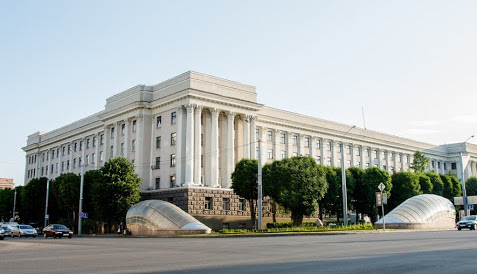The history of Belarusian-Russian University (BRU) started with the establishment of Mogilev Mechanical Engineering Institute on September 1, 1961. At that time there were two faculties at the institute. They are the faculty of mechanics and the faculty of mechanical engineering. In the 1970s the faculty of transportation, the faculty of technology and the faculty of electrical engineering were opened. In 1973 on the basis of the faculty of technology Mogilev Technology Institute was established. Then the faculty of motor vehicles and tractors was opened. In 1985 the institute accepted the first foreign students.
Belarusian Russian University

In the early 1990s on the basis of the faculty of mechanical engineering and the automobile faculty the faculty of automotive mechanical engineering was opened. The faculty of mechanics was transformed into the mechanical engineering faculty. The faculty of construction was opened in 1992 and the faculty of economics was opened in 1995.
In 2000 Mogilev Mechanical Engineering Institute was transformed into Mogilev State Technical University.
In 2003 according to the agreement signed by Belarus and Russia, Belarusian-Russian University was established.
In 2010 the faculty of engineering and economics was opened at the university.
In 2015 at the university the first festival of science in Mogilev was held.
Nowadays
BRU, that represents two countries, trained 45 thousand technical and economic experts according to the Belarusian educational programs, and more than a thousand t experts according to the Russian educational programs.
At present BRU is the largest regional scientific and educational center. The university includes a high school and a college of architecture and construction. The university consists of 8 academic buildings and 4 dormitories.
More than 5,000 local undergraduate and graduate students study at the university. In addition, there are about 360 foreign students studying at the university.
Faculties and departments of the university are the following:
1. Faculty of automotive mechanics
- Vehicle technical maintenance;
- Transportation and technical vehicles.
2. Faculty of mechanical engineering
- Technology of mechanical engineering;
- Machine tools and instruments;
- Welding industry technology and equipment;
- Metal technologies;
3. Faculty of electrical engineering
- Automatic management systems;
- Automation of conductive wire and industrial plants;
- Methods of physical control;
4. Faculty of economics
- Logistics and manufacturing process management;
- Marketing and management;
- Economy and management;
- Financeы and accounting;
- Advanced mathematics.
5. Faculty of Construction
- İndustrial and civil construction;
- Highways;
- Civil defense;
- Engineering graphic.
6. Faculty of engineering and economics
- Mechatronics and robotics;
- Electrical engineering and electrical energy;
- Land transport and technical complexes;
- Computer science and computing tools;
- Software engineering;
- Biotechnical systems and technologies;
- İnnovation studies
The number of the university staff is about a thousand people. More than 360 teachers, 20 of whom are doctors of science and professors and 150 are associate professors and candidates of science, work at the university. BRU cooperates with foreign partners in an active way. Every year teachers of the university do internships at leading universities abroad In addition, every year professors from Russia, Japan, the USA and European countries are invited to the university every year to give lectures. The distinguishing feature of BRU is the close connection to the real economy.
Technology transfer center, the center of joint use of unique scientific equipment, scientific and research laboratories, developing old and new scientific schools operate at the university. Every year the Mogilev Festival of Science is held at the university, bringing together scientists from Russia, Poland, Tajikistan and Georgia and young people engaged in science. BRUs are educational institutions and science centers in Bulgaria, Great Britain, Germany, Spain, Kazakhstan, China, Latvia, Poland, Russia, Slovakia, Tajikistan and Ukraine.
İnternational activity of BRU is one of the important ways its developing. BRU cooperates with educational institutions and scientific centers in Bulgaria, Great Britain, Germany, Spain, Kazakhstan, China, Latvia, Poland, Russia, Slovakia, Tajikistan and Ukraine.
Tuition fee for foreign students studying at BRU is $ 2 100/ a year. Foreign students can enter all faculties. The language of tuition is Russian. All foreign students are provide with dormitories. Students who do not speak Russian can enter the pre-university preparatory department. The tuition fee of the pre-university preparatory department is $ 1300. The term of apprenticeship is 1 year.
Belarusian Master’s Programs
- Economy;
- System analysis, information management ve processing;
- Electrical energy industry and ve electric vehicles;
- Construction of buildings and facilities;
- Transportation;
- İnstrument-making industry;
- Innovative technologies applied in mechanical engineering
Russian Master’s Programs
- Surface transport ve and technology complexes;
- Management;
- Finances and credit.
